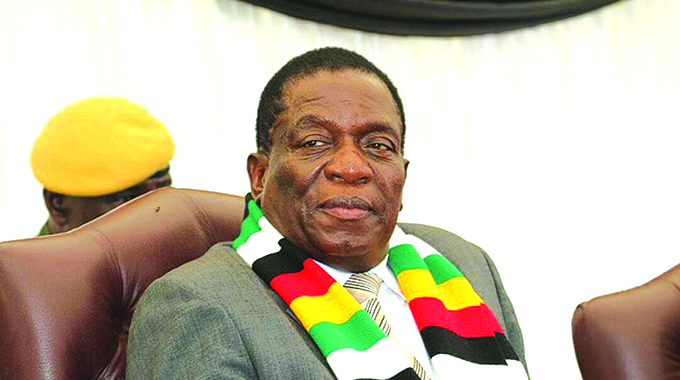Policy measures to stabilise economy bearing fruit

Herald Reporters
THE policies being implemented by the Government to stabilise the economy and strengthen the local currency by removing large sums from circulation and promoting its desirability, have started bearing fruit, with the Zimbabwe dollar becoming scarce as predicted by President Mnangagwa.
The Zimbabwe dollar is now firming against the US dollar on the parallel market and becoming scarce amid growing demand.
Foreign exchange rates have stabilised on the black market, giving a reprieve to consumers who had been hard hit by price increases in the last few months.
In response to a cocktail of policy interventions, monthly inflation has been falling for the last two months after spiking in June, and authorities expect this to be sustained into the foreseeable future, while the falling global food and energy prices should give further impetus to this.
President Mnangagwa’s prediction, while addressing a Zanu PF rally recently, that the Zimbabwe dollar would soon be sought after on account of the effective policy measures being rolled out by his administration, has been since vindicated.
“Going forward, you will see the policy measures that will be implemented to strengthen our Zimbabwe dollar for it to be highly sought after. Even when you have US dollars you will not have much joy, you will have to seek the Zimbabwe dollar; this is where we are going,” he said.
The Government has in recent months announced a cocktail of monetary and fiscal policy measures to tame the depreciation of the Zimbabwe dollar, halt the inflation resurgence, curb speculative behaviour and arbitrage activities in the domestic economy.
Some of the measures include the value for money process where the Government directed all ministries, departments and agencies to review all contracts to ensure they were appropriately priced using the interbank willing-buyer, willing-seller rate to convert from US dollar prices.
Contractors have also been directed to ensure they offer value for money.
Overpriced contracts meant contractors and suppliers to Government pocketed huge profits in Zimbabwe dollars, which they used to buy foreign currency on the black market at higher exchange rates, destabilising the Zimbabwe dollar and stoking inflation.
Contractors for key infrastructure projects are now being paid half in US dollars and the balance in local currency, which is being staggered to prevent speculation and arbitrage that hurt the domestic currency.
Another key intervention by the Government entailed directing all Government units and local authorities to collect all fees and levies in local currency, except in specified instances.
Zimbabwe National Chamber of Commerce president Mr Mike Kamungeremu said the macroeconomic stability and firming of the Zimbabwe dollar against the US dollar was on the back of the introduction of gold coins that have mopped up excess liquidity of local currency in the market.
“In fact, players in the market were short of options to preserve value, so when the gold coins came, they embraced them and some liquidity went towards that,” he said.
Mr Kamungeremu said that another positive policy intervention was the decision to slow down local currency payments to most of the Government contractors who were fuelling the parallel market rate instability.
“That one was a big step. It resulted in a liquidity crunch in the economy but I think it’s a necessary crunch, we felt the pain.
“I think almost all companies struggled to pay salaries in August but it was necessary for us to enjoy the current stability,” he said.
In order to sustain the prevailing stability, Treasury must continue to avoid pre-paying the contractors, save only for those that are into road and dam construction, said Mr Kamungeremu.
The Government has been advised to prudently moderate payments to contractors for public infrastructure projects.
“And those contractors need to be sincere because when everything in the economy is stable, it benefits everybody. So, it doesn’t work for me when I am given money by the Government to do a project to then take that money to the black market,” said Mr Kamungeremu.
“Another factor again, there has been an improvement on the auction. RBZ has been releasing money to people. So, my assumption is that once those people are paid (for public infrastructure projects) and they need foreign currency, let them go to the auction.
“The RBZ has been releasing a lot of foreign currency. If they get the forex from the auction there is no need to be speculative; no need to fuel the black market. We heard that some previously used rates that were way above $1 000:US$1.”
Such people were forward pricing to preserve value, said Mr Kamungeremu, but with the current stability there is no justification to do that anymore.
“The gap has narrowed between the parallel market and the official rates and that supported by the auction system, everything will turn out to be what everyone wants so that stability can be sustained getting to the end of the year.”
To sustain and improve the prevailing economic stability, Mr Kamungeremu said the Government should reconfigure the financing model for key infrastructure projects, with floating of a Government bond for long-term infrastructure projects ideal, to avoid upsetting the market.
“What is also critical for the purposes of sustaining all these, is confidence and confidence comes from the people and when we see the Government showing some seriousness like they have done, my appeal to businesspeople and all the players in the economy is to be positive and support the Government.
“So, we need to get the diaspora to finance infrastructure projects here as long as we structure a proper scheme that will be good for them in the long-term,” he said.
Latest data from the RBZ indicates that Zimbabwe’s diaspora remittances clocked US$797 million in the first six months of the year, representing a 23 percent increase from US$650 million received in the corresponding period in 2021.
Economist Professor Gift Mugano encouraged the Government to “vigorously allow competitive bidders” for services being provided so as to take away the monopoly situation and the charging of higher prices.
He said the Government should also consider buying directly from manufacturers.
“Government departments must pay service providers on time. Again that’s the reason why you see service providers charging forward rates because they would want to compensate for the delays in payment.
“We need to see convergence of the black market and official rates”.
The Office of the President and Cabinet, said Prof Mugano, should take centre stage in overseeing policy implementation.
Government advisor, Professor Ashok Chakravarti said the firming of the local currency against the greenback was on account of the measures the Government was implementing to control money supply growth and interventions to regulate public expenditure.
“Those are the two thrusts which the Government has taken, it’s very sustainable and we have to continue to do this for some time until the market understands that these measures are here to stay to create stability for the exchange rate,” he said.
Economist Mr Persistence Gwanyanya also said the measures adopted by the Government had brought stability.
“Business should sooner, rather than later, realise that the honeymoon is over and revise prices downwards,” he said.
“Failure to do that will see them penalised by demand. The honeymoon is over and business need to go back to basics where productivity, not speculation or arbitrage, is key; entrepreneurship, not tenderpreneurship, is key.”
Mr Gwanyanya added that Government was determined to support the local currency to make it a currency of choice.
“There should be no going back on the current stabilisation measures as there is currently no greater gift to the people of Zimbabwe than guaranteeing stability. Stability is good for everyone and does not mean a strong currency.”
He said the measures introduced to curb inflation are likely to see the local currency stabilising at US$1: $600.










Comments